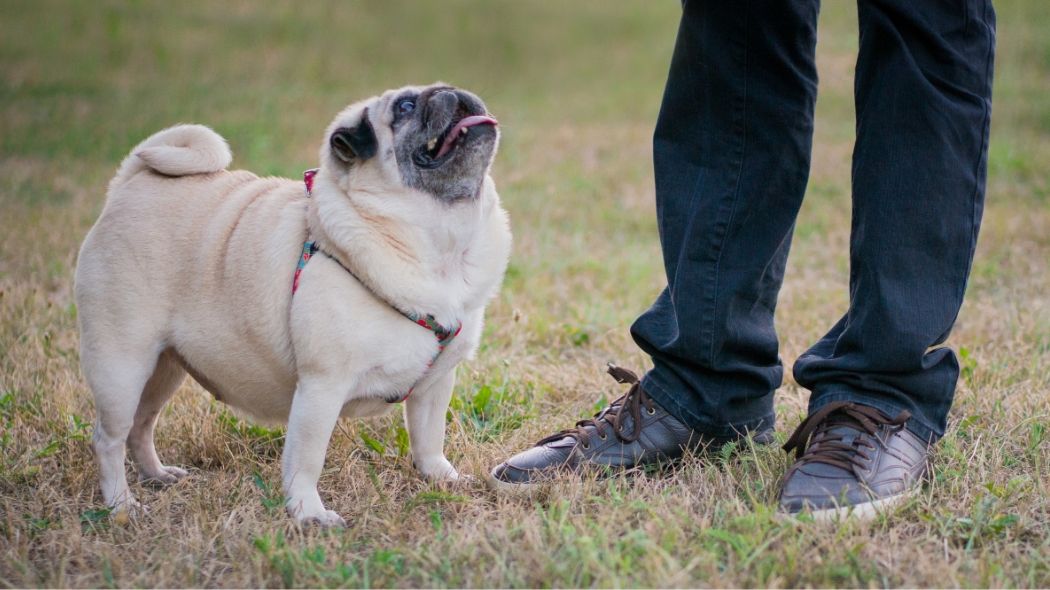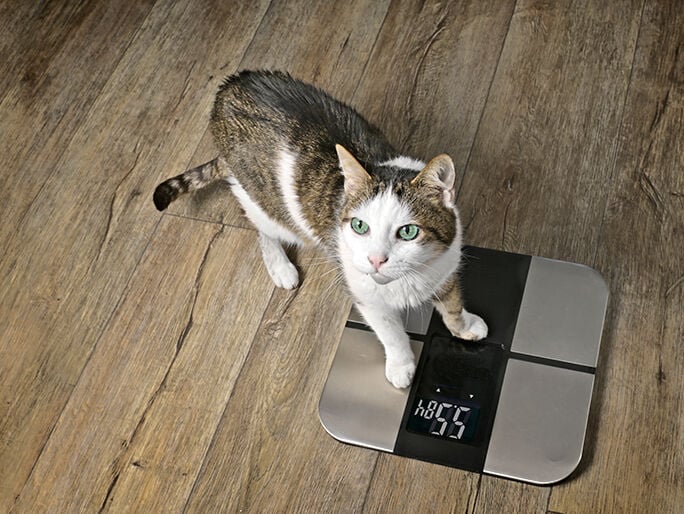food and diet tips for obese pets
Pet obesity is incredibly common — and a serious health issue.
A healthy weight is a big part of your pet’s overall well-being. Obesity in pets is linked to arthritis, diabetes, heart problems, shorter life spans, higher vet bills, and more.

Common reasons for obesity in pets
- Overfeeding
- Incorrect diets
- Lack of exercise
- Health conditions
- Genetics

Ways to help overweight dogs and cats
- Regular meal schedules
- Tracking treats
- Controlled diets
- Healthy exercise
- Counting calories
How do you know if your pet is overweight or obese?
Pets being overweight or obese is incredibly common — so common that many people have no idea just how serious it is. Your pet’s body just isn’t designed to carry too many extra pounds.

How to tell if your pet is obese
Want to know if your pet has too much padding? See if you can feel their ribs. You shouldn’t be able to play them like a xylophone (that’s way too skinny), but you should be able to feel the ridges underneath their skin without pressing hard. If you’re looking at your pet from above, they should have a waist, or an indentation between their ribcage and hips.

Ideal weight
Ribs easily felt, but not seen, with an obvious waist
Overweight
Ribs not easily seen or felt, with unnoticeable waist
Obese
Ribs not felt, with absent waistline that may even bulge outWhat causes obesity in dogs and cats
One out of every three pets are considered overweight or obese. Here are the most common reasons why your pet may be carrying too much weight.
Overfeeding
Pets love food, and owners love their pets. Treats and meals are an obvious way to give your pet what they enjoy.
Solution: Need help portioning food for your overweight dog? Or devising a diet for your overweight cat? Your veterinary team is happy to help. And we include treats in our meal plans — we promise.
The wrong foods
People foods aren’t meant for pets. Table scraps are loaded with calories that often contribute to pet obesity. Just one bite can put off a pet’s calorie count for the entire day.
Solution: It can be hard to ignore pleading eyes and ankle rubs, but it’s really better for your pet if you resist.
Not enough exercise
Dogs and cats that don’t have enough movement in their routine are prone to obesity.
Solution: Creating a custom exercise routine for your cat or dog can be easy and fun. Exercise can help them stay trim and help boost their health and happiness.
Health conditions
Certain health conditions, like arthritis or joint pain, may make your pet reluctant to exercise, while issues like heart disease may mean they need to take it easy. Hormone imbalances may also cause your pet to gain weight.
Solution: Talk to your veterinary team! Your vet may be able to prescribe medications to make movement easier and set an exercise routine that works for both you and your pet.
It’s in their genes
Is your Labrador Retriever or Cocker Spaniel always mooching for snacks? What about your Maine Coon? These dog and cat breeds may just be made that way. Certain breeds tend to gain weight, possibly due to a mutation in genes that control hunger and the feeling of fullness.
Solution: A strict diet can help keep your pet at a healthy weight. Ask your veterinary team what other tips we recommend — different pets have different calorie needs.
How to help your pet maintain a healthy weight with exercise and a quality diet
Even the chunkiest cat or pudgiest pup can get back to a healthier weight! Ask your veterinary team for tips on quality food, appropriate serving sizes, activity needs, and a healthy weight range for your BFF.
Here are some tips to get started.
-
Count calories and stick to a feeding schedule
-
Keep track of treats
-
Make sure you know what they’re eating
-
Exercise for the win
Talk to your vet about your pet’s daily calorie needs. Then be strict. If you’re splitting calories between a few meals a day, keep those regular times.
We know how fun it is to give pets treats! And you don’t have to deny them — just make sure they’re included in your pet’s daily calorie count. Plus, food isn’t the only way to show love. Petting, admiration, walks, and time with favorite toys are also deeply rewarding for your pet.
Pets like dieting about as much as people do. Your pet may respond by getting into the garbage, acting out, or stealing food from people or other pets. These behaviors can be a health and safety hazard, so please mention them to your veterinary team.
Your pet doesn’t need to run marathons to be fit. Dogs can benefit from a quiet stroll around the neighborhood, while even the most dignified cat may go nuts for a jingle ball, feather teaser, or laser pointer. Every little bit counts!
Ask your veterinary team about how to start an exercise routine for your BFF, especially for pets with health issues like heart disease, arthritis, or joint injuries. And if you decide to run that marathon together, remember to start slow — pets need couch-to-5K training just as much as people do!

Need advice on flea control? Ping Pet Chat™!
Whether it's 3 a.m. or 3 p.m., connect with a real veterinary professional for immediate petcare advice. It's included in all Optimum Wellness Plans®!
Log in to start chattingHow Banfield can help with dog and cat diet and nutrition
What your pet eats can make a big difference to their health! Our vets can perform physical exams, run tests, and help you manage your pet’s food-related issues, including obesity, diabetes, and food allergies.

Get help managing pet food allergies. Do you think your pet’s immune system is reacting to certain ingredients in their food? We can help identify pet food allergies and work with you on management diets.
Does your pet have diabetes? Let’s work together! This includes everything from recommendations on what to feed your pet, how to manage their food and injection schedule, providing appropriate prescriptions, and showing you how to safely perform insulin injections for the pet you love.
We can help your pet reach a healthy weight. We've got advice on diet and exercise for both overweight and underweight pets. Does your pet have a mobility issue that makes it hard for them to exercise? We can help there, too.
 Mites and mange
Mites and mange Podcast - Not Just Fluff
Podcast - Not Just Fluff




